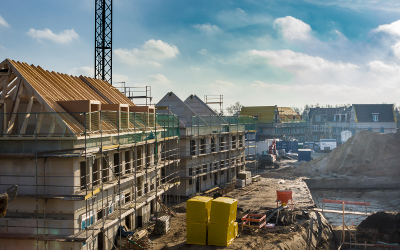OU researchers in coalition developing UK’s low-carbon building standards

Open University (OU) researchers Dr Alice Moncaster and Jane Anderson are part of a coalition of construction industry experts and academics developing the UK’s Net Zero Carbon Buildings Standard (NZCBS) to transform the construction industry.
Once created, the standard will provide a single agreed definition for the industry to determine what constitutes a net zero carbon building, dramatically boosting sustainability in construction.
The NZCBS coalition is now calling on UK built environment industry practitioners to supply operational energy and embodied carbon performance data for their buildings. This evidence will support the creation of the Standard and boost its effectiveness.
Dr Alice Moncaster, Senior Lecturer in General Engineering at The OU, is part of the Embodied Carbon Task Group. She said:
“The new Net Zero Carbon Buildings Standard, which at last considers the embodied carbon costs of construction as well as the operational carbon from operating a building, should result in major changes to what, and how much, gets built, and change the face of construction as we know it.
“The construction industry I used to work in will morph out of all recognition. Rather than concrete and steel, we should see much more timber and bio-based materials such as straw being used, with our nascent cross-laminated timber (CLT) industry growing and adding another reason for planting trees which will lock-in carbon emissions.”
Preserving history for a greener future
“I hope we will also see wide changes in planning, resulting in fewer, more thought out, and lower whole life carbon, new buildings. The widespread demolition of structurally sound buildings, such as the Oxford Street M&S store, the subject of a recent public inquiry, should also become a thing of the past.
“I hope that this is the first step along the road to a new future, in which instead of numerous shiny new buildings in concrete, steel and glass, with huge carbon cost, we focus much more on the careful retrofitting and maintenance of our existing buildings, on reducing materials as well as energy, and on making our built environment more fit for an uncertain future,” said Dr Moncaster.
To develop the Standard, the coalition will agree on benchmarks for operational energy usage and embodied carbon performance levels today. It will also set limits and targets for future years based on the industry’s required decarbonisation trajectory.
Dr Moncaster added:
“As with all parts of our life, this is the time to appreciate and look after what we have. We need to end the wilful use of materials, and emissions of greenhouse gases, as if we still believe our world’s resources and atmosphere to be indestructible.”
The coalition invites those wishing to contribute to the development of the Standard to submit data via the Built Environment Carbon Database. The deadline for submitting is 16th December 2022.
A version of this story, written by Laura Bandell, originally appeared on OU News.
You may also be interested in:
Quarterly Review of Research
Read our Quarterly Review of Research to learn about our latest quality academic output.

Contact our news team
For all out of hours enquiries, please telephone +44 (0)7901 515891
Contact details